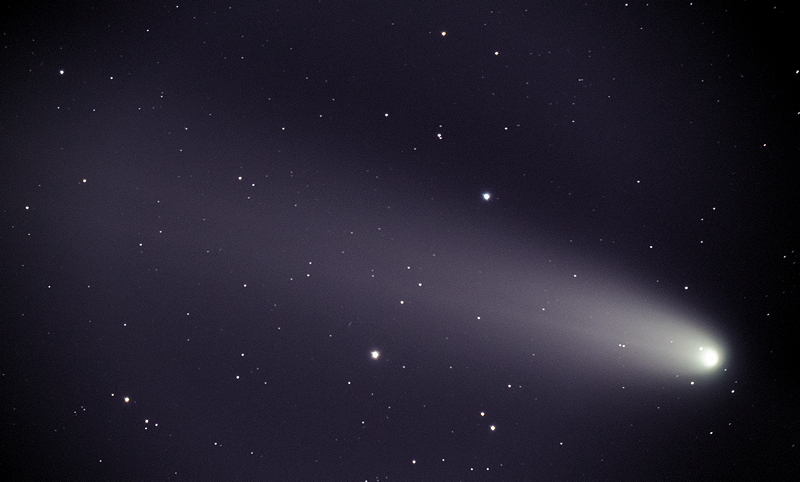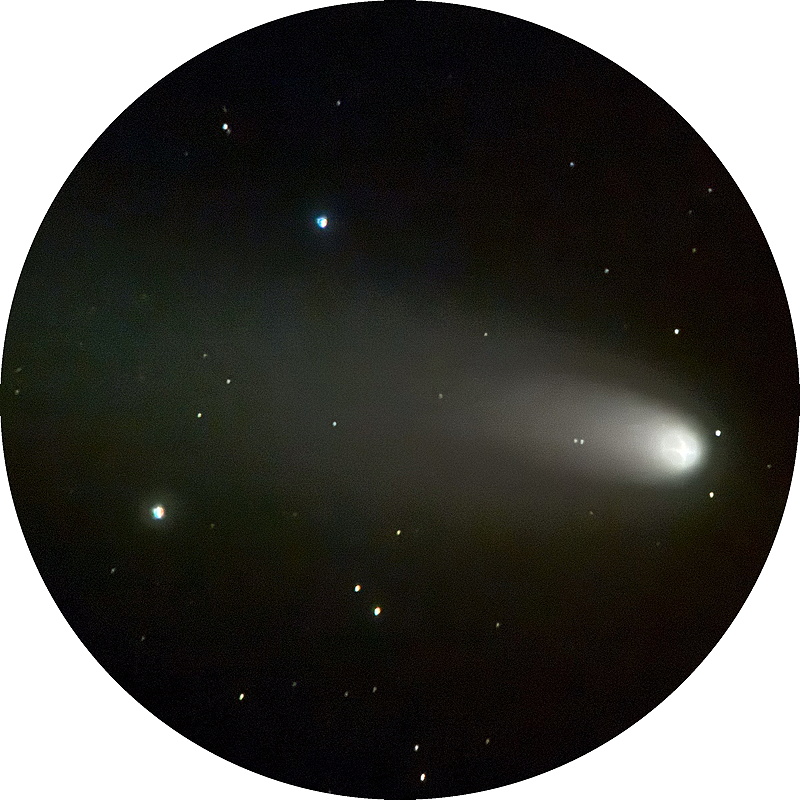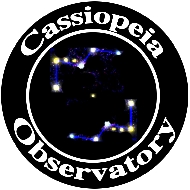Comet Tsuchinshan-ATLAS (C/2023 A3),
Barnard Objects viewing, Falcon 9 Rocket Launch
Posted: 20 October 2024
Friday, 18 October 2024, was cloudy with periods of rain (0.14"). The sky cleared on Saturday, 19 October.
|
Open: Saturday, 19 October 2024, 1734 MST Temperature: 69°F |
Session: 2021 Conditions: Clear |
Equipment:
12" f/8 LX600 w/StarLock
2" 24mm UWA eyepiece
12x50 binoculars
Camera:
D850 DSLR
iPhone 15 Pro Max
1741 MST: Dome Cover OFF.
1744 MST: Sunset. Prepared the D850 DSLR for imaging.
1750 MST: LX600 ON, StarLock OFF, High Precision ON.
Viewed the planet Venus, 102X. A nice gibbous phase was visible.
Slewed to Comet Tsuchinshan-ATLAS (C/2023 A3). It was not yet visible in the bright twilight sky.
1800 MST: Relaxed on the observatory patio bench while waiting for the sky to get darker.
1810 MST: Checked on the comet. It was faintly visible in the bright twilight sky, 102X. Then I returned to the bench.
1825 MST: The comet was visible, 12x50 binoculars. A faint 3° long tail was visible in the binoculars.
1828 MST: Returned to the observatory. Viewed the comet, 102X.
Mounted the D850 DSLR at prime focus + focal reducer, focused on the star Altair, locked the 12" primary mirror, and slewed to the comet.
1839 MST: StarLock ON.
Took some StarLock autoguided images of Comet Tsuchinshan-ATLAS, prime focus + focal reducer, 30 seconds, ISO 2000.

1847 MST: StarLock OFF.
Viewed the comet again, 102X.
Attached the LiDAR Cover on the iPhone 15 Pro Max. Took this handheld iPhone afocal 102X image (Night Mode, 3 seconds, 1X lens) of Comet Tsuchinshan-ATLAS.

1901 MST: I began observing (or tried to) more Barnard Objects (dark nebulae) for my Barnard Objects Project, 102X: B320, B114, B115, B116, B117, B118, B117a, B119, B120, B321, B119a, B121, B322, B122, and B123.
1930 MST: The sky was brightening from the rising waning gibbous Moon.
Viewed the planets Saturn and Neptune, 102X.
1942 MST: LX600 OFF.
|
Close: Saturday, 19 October 2024, 1952 MST Temperature: 52°F |
Session Length: 2h 18m Conditions: Clear |
2213 MST: SpaceX launched a Falcon 9 rocket from Vandenberg Space Force Base in California. I took these handheld iPhone 15 Pro Max photos (Night Mode, 3 seconds, 1X lens, cropped) of the launch. The second photo shows the 1st stage boostback burn (the brightest dot). The waning gibbous Moon brightened the night sky. The rocket launch was faintly visible to the naked eye.








Comments are welcome using Email. Please read the Email Etiquette guidance.
Cassiopeia Observatory Home Page
Copyright ©2024 Michael L. Weasner / mweasner@mac.com.
URL = http://www.weasner.com/co/Reports/2024/10/20/index.html
